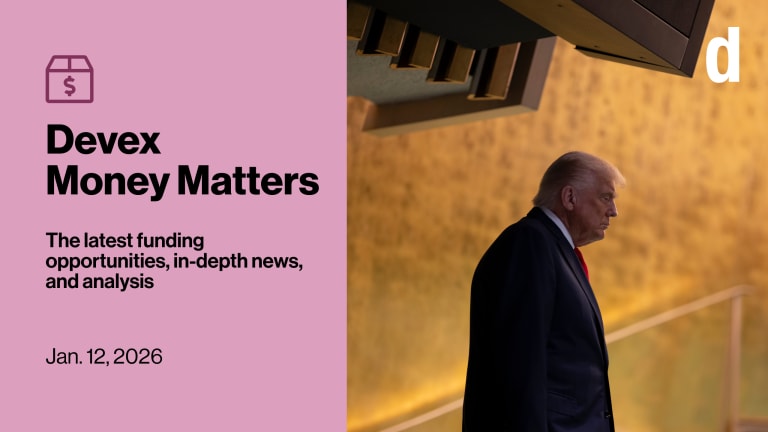
BRUSSELS/ALICANTE, Spain — Médecins Sans Frontières is standing by its decision to accept donations from investment giant BlackRock despite concerns from staff, some of whom want an overhaul of the NGO’s policy on corporate funding.
“Incredible support!” MSF-USA tweeted on Aug. 21. “Thank you @BlackRock for the generous $500,000 grant towards our COVID-19 Crisis Fund. We are responding to the pandemic in over 70 countries, providing lifesaving care and infection control preparedness during this unprecedented global emergency.”
MSF-USA has received $3.4 million from BlackRock and its employees since 2006, Laurence Marie Lombart, director of corporate relations at MSF-USA, told Devex by email last week. The money has also supported MSF’s work with Rohingya refugees and programs for migrants and asylum-seekers in Mexico and Central America.
BlackRock, an investment management firm, has shares in weapons, tobacco, alcohol, and pharmaceutical companies, including those MSF has previously criticized such as Johnson & Johnson, Eli Lilly, and Abbott Laboratories. MSF is not the only humanitarian organization to receive funding from BlackRock. The International Rescue Committee also listed the firm as a $1 million-plus donor in its 2018 annual report.
The tweet raised eyebrows on social media, with MSF’s own staff criticizing the decision. Lombart told Devex that comments under the tweet were muted due to the organization’s limited capacity to respond to social media inquiries over the weekend.
Opinion: How to boost accountability and learning in aid for COVID-19
Here are four areas that designers, policymakers, and evaluators can engage as international financial and development institutions go up against the coronavirus.
The criticism continued privately in internal meetings and on an online staff forum. Dalila Mahdawi, who works in communications for MSF in Amsterdam, posted in the forum that MSF’s acceptance of BlackRock’s donation was like the story “of a man who sells his soul to the devil in return for a favour.”
The NGO’s policy on donations states that MSF will not accept money from companies “whose core activities may be in direct conflict with the goals of the medical humanitarian work of MSF or which may limit MSF's ability to provide humanitarian assistance in any way.” Excluded companies under the policy are “those that derive a significant portion of their income from the production and/or sale of tobacco, alcohol, arms, pharmaceuticals (including: medicines, medical equipment, therapeutic foods, diagnostic and biotechnical materials, and research), and/or mineral, oil, gas, or other extractive industries.”
BlackRock did not respond to a request for comment, referring instead to responses given by MSF-USA. Lombart wrote that BlackRock was “carefully vetted” and does not fall foul of rules on corporate gifts, adding that “investment firms such as BlackRock generally have diverse portfolios and are not considered ‘excluded industries’ under this policy.”
For Mahdawi, however, BlackRock’s links to weapons manufacturing, climate change, and “America's racist industrial prison complex” are in direct contradiction to MSF’s work. “They undermine MSF’s alleged intentions to address structural racism, or to demonstrate solidarity, and lend credibility to companies who are actively contributing to, and perpetuating, global harm,” she wrote. “I understand the need for financial support but there doesn’t seem to be any point in trying to heal people if it’s being paid for by those who hurt them.”
She is not alone in her thinking.
Yazan Al-Saadi, a Syrian/Canadian writer, researcher, and former MSF employee, told Devex: “The idea of a humanitarian organization accepting that type of money from that type of organization, that’s one level where alarm bells have to go off.”
Al-Saadi also called it a manifestation of “MSF’s inherent problem with institutional racism.” Earlier this year, the medical charity came under fire after 1,000 former and current staffers called it out for “reinforcing colonialism and white supremacy.”
When building the MSF branch office in Beirut, Al-Saadi recalled conversations about how to ensure funding infrastructure in a context where there may be issues of corruption. “What is very apparent to me is the same stringent style of ethics and concern isn’t applicable in North American and European fundraising,” he said, calling the situation offensive.
James Smith, an MSF humanitarian affairs adviser, told Devex by phone on Thursday that MSF had always emphasized its financial independence — favoring small donations rather than lump sums from governments — as a way to build credibility and gain access to deliver assistance in difficult settings.
“It’s that financial independence that sets MSF apart,” he said. “Otherwise there are even fewer features that distinguish us from a multitude of other organizations.”
Smith said firms as big as BlackRock that may not derive a “significant proportion” of their income from banned industries could still have tens of millions of dollars invested in those sectors.
“It’s a shortcoming of the policy and I am concerned by our decision to revert back to quoting the policy back to ourselves,” Smith said. “We may well be in line with the policy itself, but that doesn’t necessarily mean that we have taken an ethical stance.”
Michael Neuman, coordinator and director of studies at MSF-Crash — an internal MSF think tank designed to improve the association's actions — has no problem with MSF accepting the donation, but said it does open up a bigger conversation about what can be called dirty or clean money. “From an organization that has been very vocal about refusing money from the European Union, it can seem strange to accept money from BlackRock,” he said.
In 2016, MSF began refusing EU funding in protest of its migration policies.
“If you want to be sure you have absolutely pure money you run the risk of actually cutting short a lot of sources of money,” Neuman said. As long as there is no deal between the recipient and donor in terms of publicity, organizations should be driven by an ethics of responsibility and action and not of “moral purity,” he added.
“One question is ... how to close the gap between the reality of an organization whose rationale is to help people — with money — and a self-portrait that is taking the organization a bit far from that objective?” he said.
Lombart wrote that this was MSF’s first tweet thanking BlackRock, but it had publicly recognized BlackRock’s support for years. “However, BlackRock has made announcements about supporting MSF in the past, including this particular $500K grant in March,” Lombart added.
Asked whether the funding from BlackRock came with the requirement that MSF promote the donation, Lombart replied that “corporate supporters at this level of giving generally receive public acknowledgments on social media and other channels.”
Asked about employee opposition to the BlackRock decision, which was discussed in internal meetings last week, Lombart praised the “strong culture of debate with MSF” and added that “we welcome the questions being raised in meetings and by individuals.”
“We regularly keep these policies under review to ensure that they align with our principles and values,” Lombart wrote.









